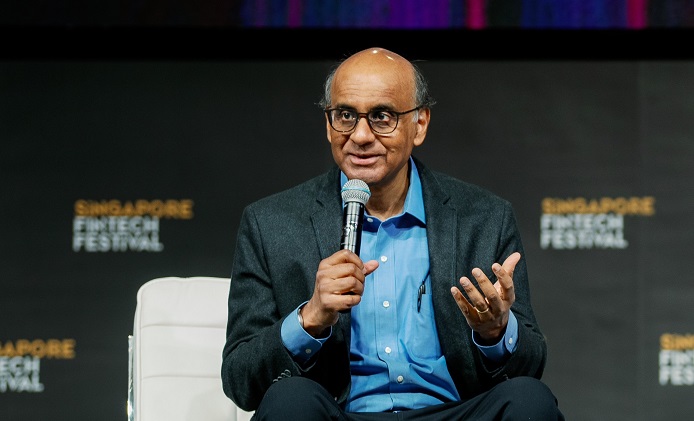SINGAPORE, November 15, 2023 – A whole range of jobs that require IQ can be taken over quite quickly and those can be done more efficiently using LLMs and AI. Singapore President, Mr Tharman Shanmugaratnam while speaking at a fireside chat on the inaugural day of the 3-day Singapore Fintech Festival (SFF) here said that the rise of artificial intelligence (AI) will cause a “positive” shift in the traditional hierarchy of jobs.
The three-day SFF brings together policy, finance and technology players from around the world to discuss cutting-edge financial solutions, evolving regulatory landscapes and the latest technological innovations.
Similar to other major technological advancements, artificial intelligence is expected to cause widespread disruption, including in the labour market. And not all will be winners in this regard, according to Mr Shanmugaratnam.

“What you regard as a better job and a job that deserves better pay might shift considerably in the years to come. The way we value IQ over EQ might change. We will then have to think hard about the jobs we really value – the jobs that require teamwork, the jobs that require collective imagination and the care jobs, and we’ll have to value them accordingly,” he said.
Developing economies with surplus talent will be hit in areas like business process outsourcing or the export of ICT (information and communication technology) services. In contrast, more mature economies could benefit from the changes. However, countries like Singapore which have because we are short of people may find some advantages in the emerging situation.
Cognitive Skills
Even within Singapore, some will be affected with likely displacement of certain jobs, particularly those with rote tasks that can be easily automated. On the other hand, other workers will be enabled by new AI-related tools or provide added value via higher cognitive skills.
This technological revolution is set to have a more profound effect on the workforce and society than any previous technological revolutions. As such, it is important to think through and find ways to address its distributional consequences. “It’s a collective task and we need to think of ourselves as a social organization to address this,” said Mr Tharman added.
Mr Tharman also went on to highlight the need to constantly educate oneself and be equipped to handle technology in a rapidly changing scenario. Later the President went through some of the exhibition booths and was keenly understanding the various financial technologies at play by different global organisations.

